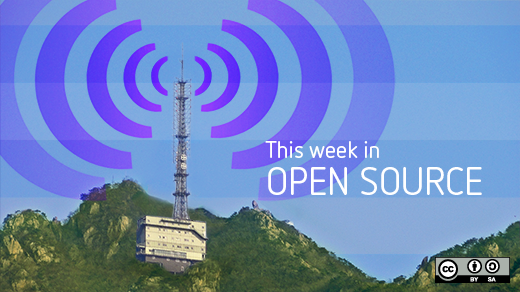In this week's edition of our open source news roundup, we take a look at a million lines of code for Linux, more open source software from Google and Microsoft, a new tiny computer for education, and more!
Open source news: July 4 to July 10, 2015
Latest Linux kernel bulks up
One million. That's a big number. And that's the number of lines of new code that have been added to the latest release candidate for the Linux kernel. According to Linus Torvalds, "if you count the size in pure number of lines changed, this really seems to be the biggest RC (release candidate) we've ever had, with over a million lines added."
Most of that, according to The Register, comes in the form of new AMD graphics drivers. The rest of that code revolves around support for a new processor architecture as well as a support for ARM devices. A lot of code in the kernel was cleaned up, too.
It wasn't all gain. There was some loss, too. According to Torvalds, approximately 250,000 lines of code were removed from the kernel. But it's going to be somet time before the new kernel hits your favorite distro. Softpedia reports that "it's going to take a few weeks until this version of the kernel becomes stable, and then distro developers will have to adopt it."
Google open sources deep learning software
Ever wonder what deep learning software sees when it does visualizations of data? If you answered yes, then Google's DeepDream project is right up your alley. VentureBeat reports that Google "has open-sourced its code for generating wild and crazy images using a type of artificial intelligence called deep learning."
DreamDeep simulates what neural networks see when they try to makes sense of masses of data thrown at them. Google has "seen a lot of interest and received some great questions, from programmers and artists alike, about the details of how these visualizations are made," according to a post on the Google Research blog. That interest prompted Google to release the code as open source.
If you're curious, you can take a peek at the project's code on GitHub.
Microsoft releases WorldWide Telescope as open source
Not to be outdone by one of its rivals, Microsoft has released the source code for its WorldWide Telescope (WTW) project as open source. WorldWide Telescope is software that takes existing astronomical data and uses that data to create custom visualizations. According to ExtremeTech, "to expand the scope of the original WWT mission and explore new ways of using this information in educational and outreach projects."
A blog post at the Microsoft Development Network states the company believes that "extensions and improvements to the software will continuously enhance formal and informal learning and astronomical research." You can grab the source code from GitHub and take WorldWide Telescope for a test drive.
BBC unveils the Micro:bit programmable computer for kids
Back in early 1980s, the British Broadcasting Corporation (BBC) teamed up with Acorn Computers to create the BBC Micro. The goal of that project was to make Britons more computer literate. The focus of the BBC Micro was education, and it lasted for about 12 years. This week, the BBC resurrected the spirit of that initative by unveiling the Micro:bit.
Taking its cue from the Raspberry Pi, the Micro:bit is a bare bones computer board that kids can use for a variety of computing and programming projects. The Micro:bit is tiny—about the side of a credit card. According to Engadget, the tiny device packs "25 red LEDs, which can show messages and facilitate games, two programmable buttons, an on-board accelerometer and magnetometer." It also has a microUSB port, five input/output rings, and a Bluetooth module.
A CNET report states that BBC will start giving one million Micro:bits to starting in October 2015. The target audience is kids between 11 and 12 years old.
In other news
- PipelineDB releases an open source streaming SQL database
- Canonical and Lenovo to start selling Ubuntu-powered laptops in India
- The European Commission to release the code of an editor for drafting legal texts as open source
- YotaPhone dumps Android for Sailfish OS
- Open source databases challenge Oracle's market dominance
A big thanks, as always, to the Opensource.com moderators and staff for their help this week.







1 Comment